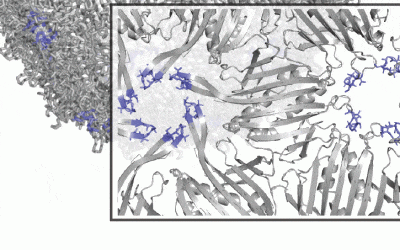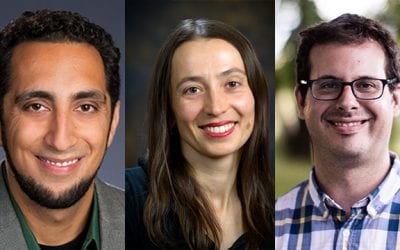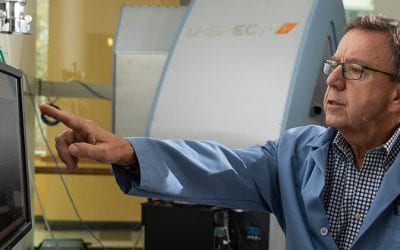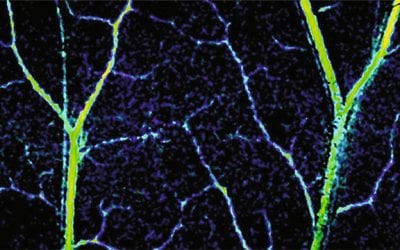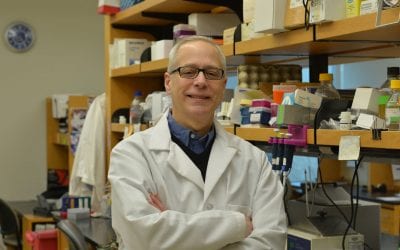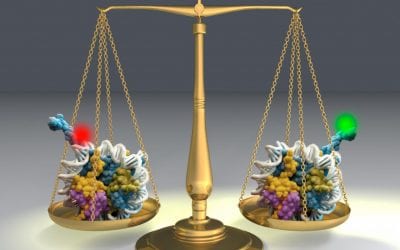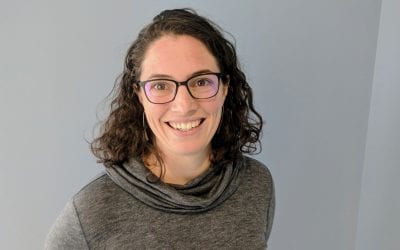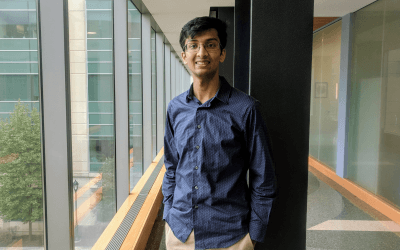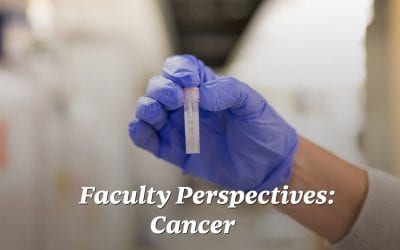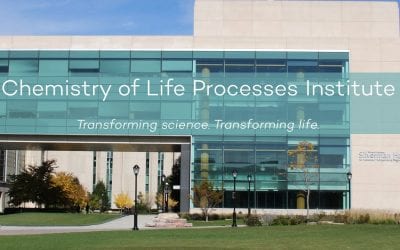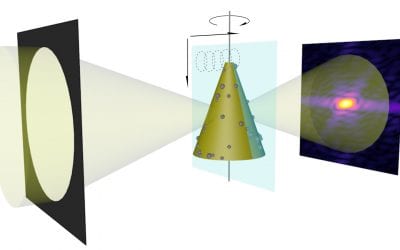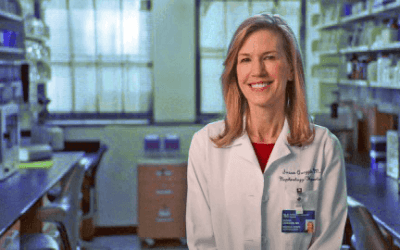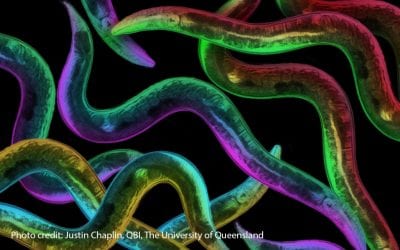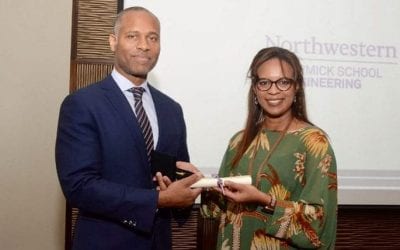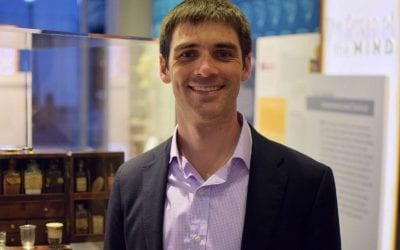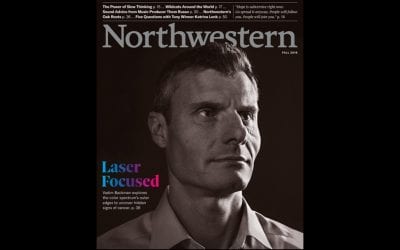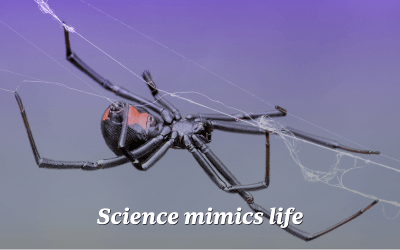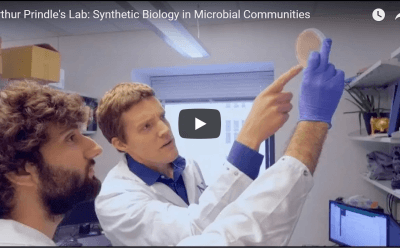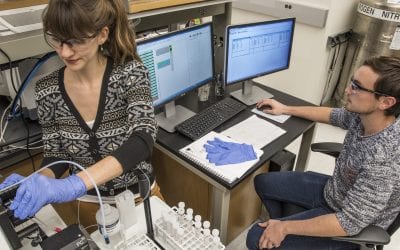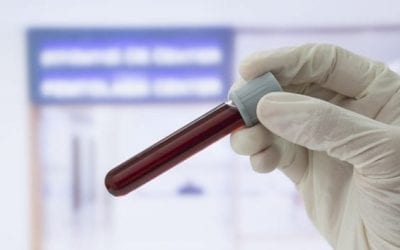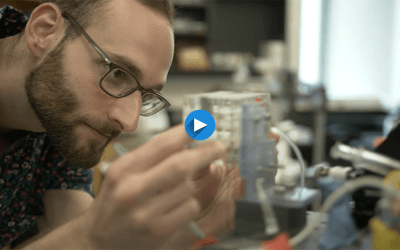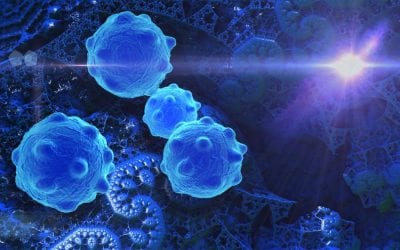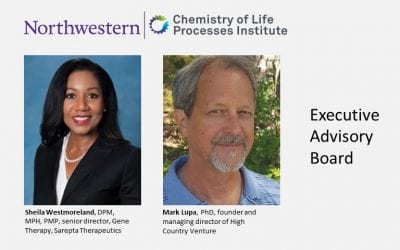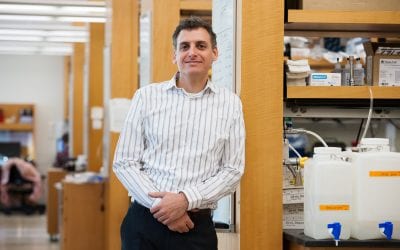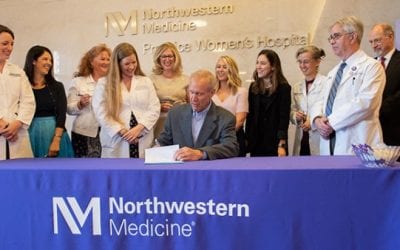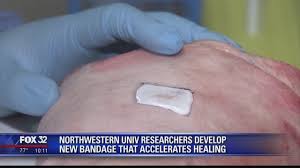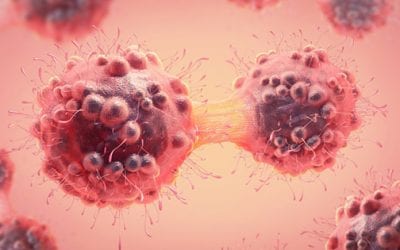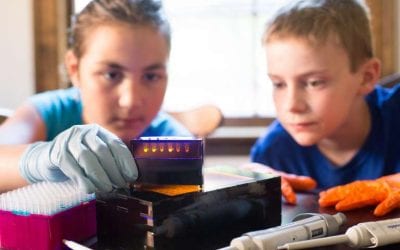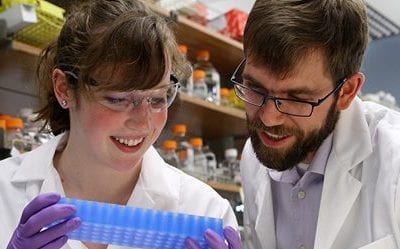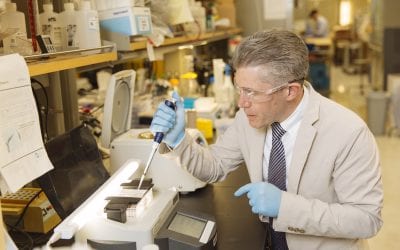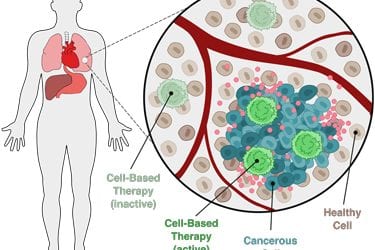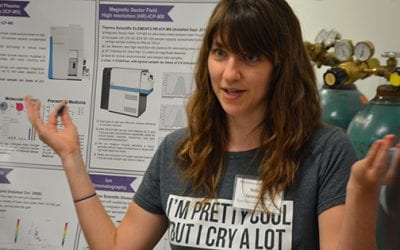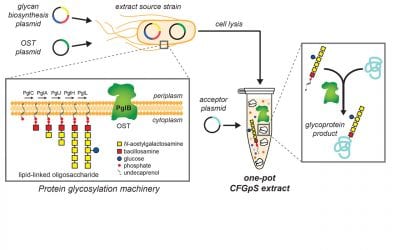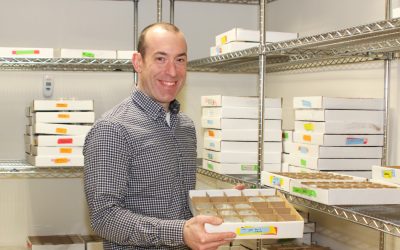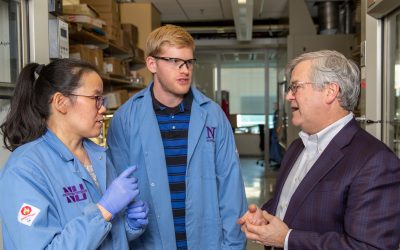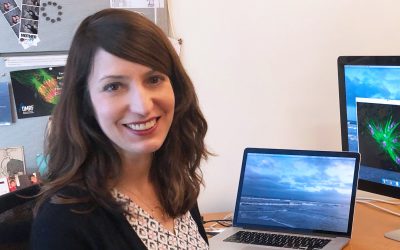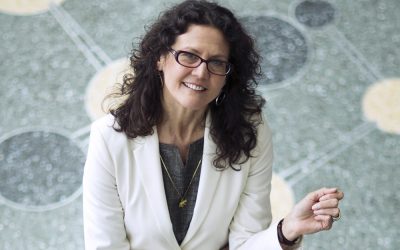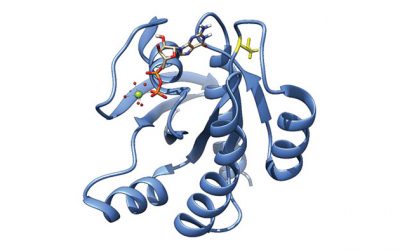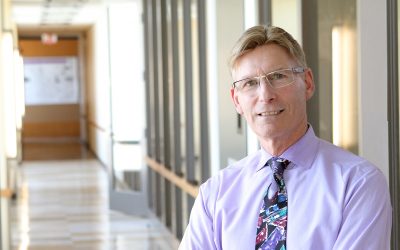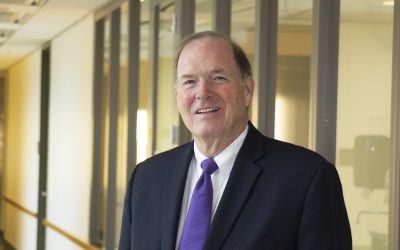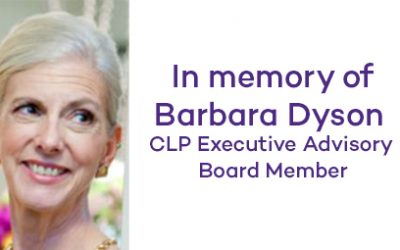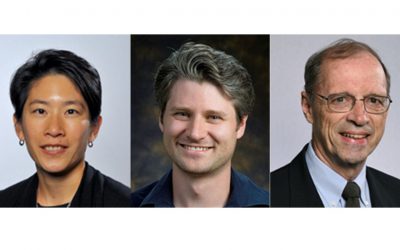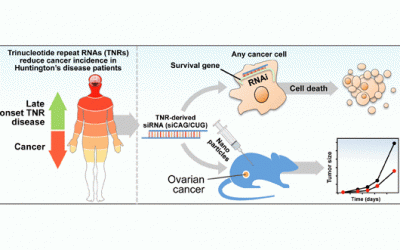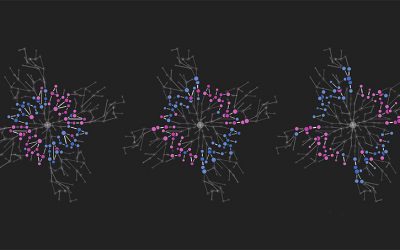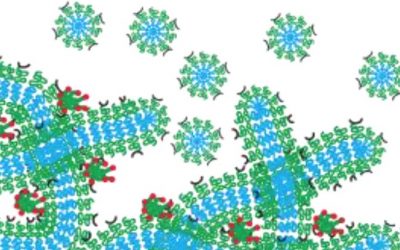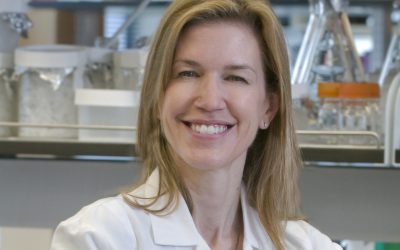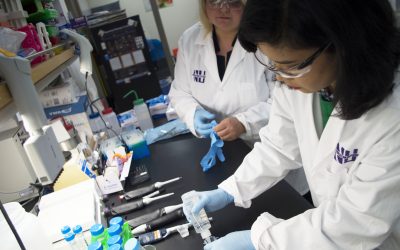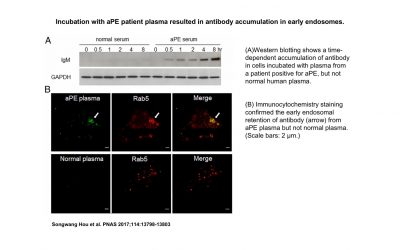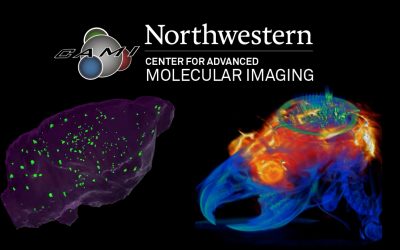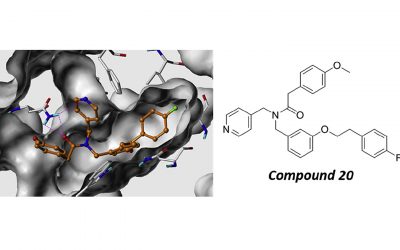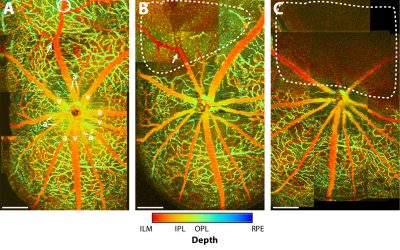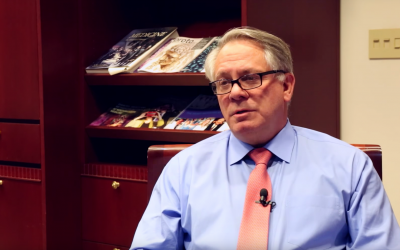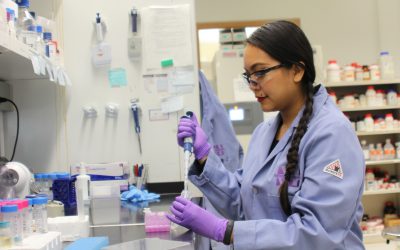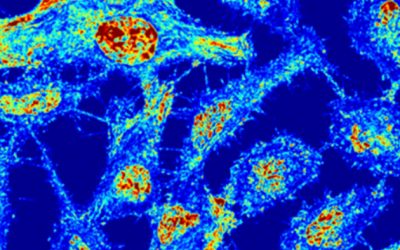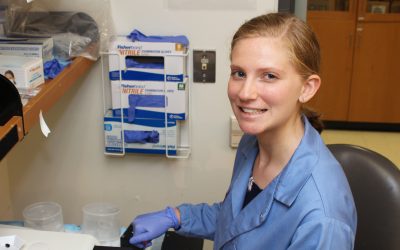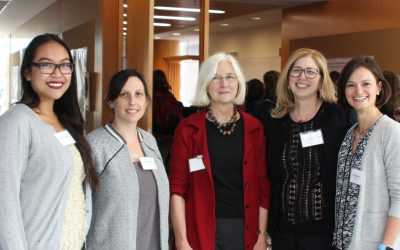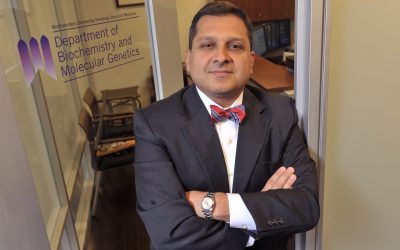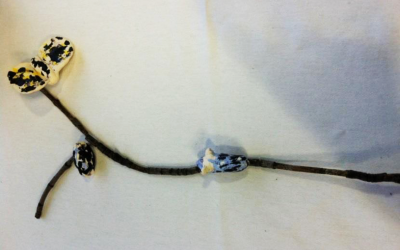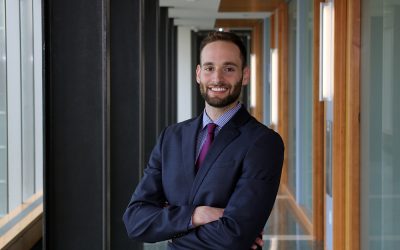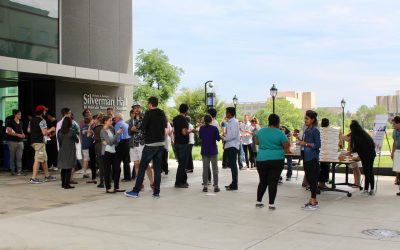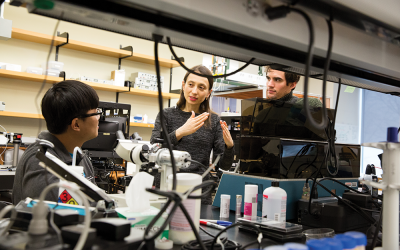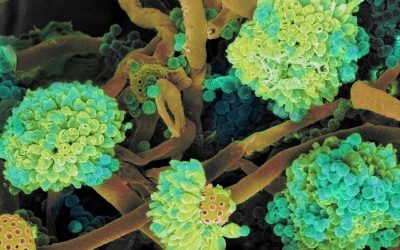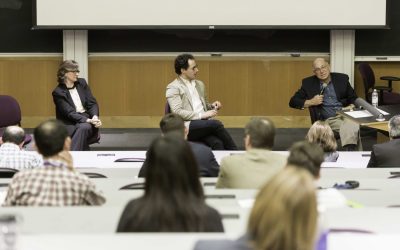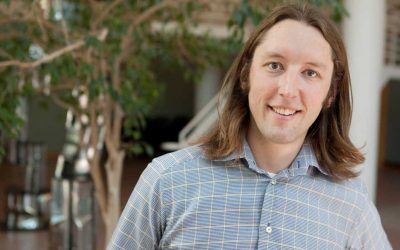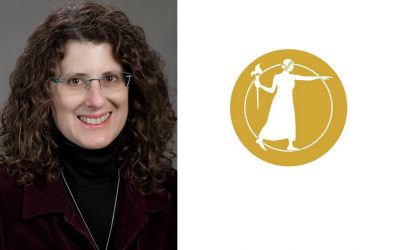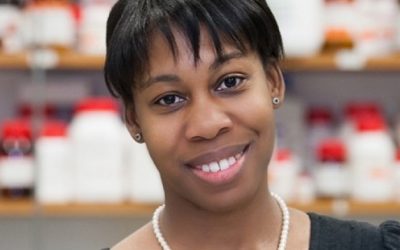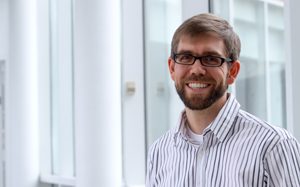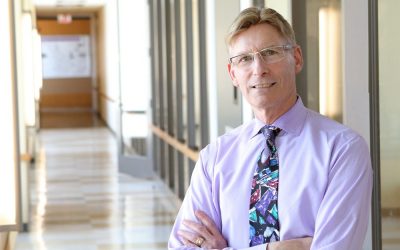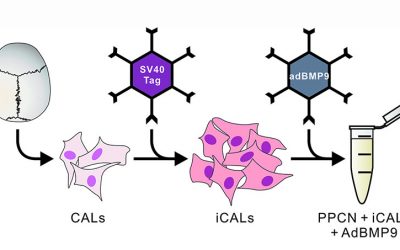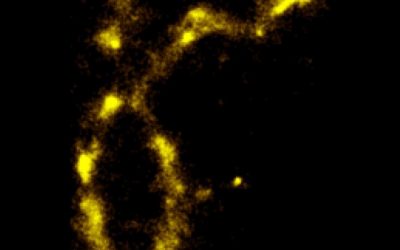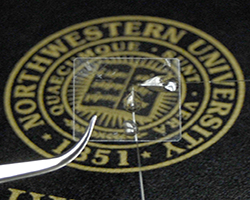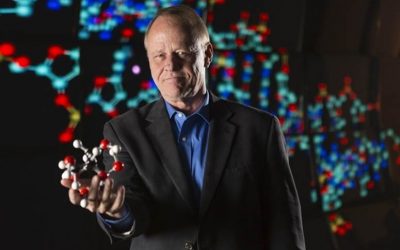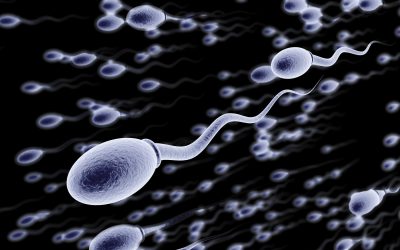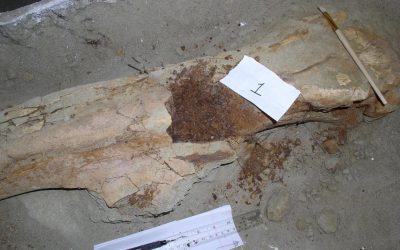News Archive
Revealing the Rules Behind Virus Scaffold Construction
A team of researchers including Northwestern Engineering faculty has expanded the understanding of how virus shells self-assemble, an important step toward developing techniques that use viruses as vehicles to deliver targeted drugs and therapeutics throughout the...
Promising young faculty receive prestigious career award
Three Northwestern University assistant professors — Nicholas Diakopoulos, Yevgenia Kozorovitskiy and Sepehr Vakil — have received the prestigious Faculty Early Career Development (CAREER) Award from the National Science Foundation (NSF), the foundation’s most...
A new approach to a deadly disease
A New Approach to a Deadly Disease A career spent bucking convention leads Bill Klein to new Alzheimer's diagnostics and therapeutics “When I was in graduate school, three papers per month were published on Alzheimer’s disease. Now, there are thousands every month.”...
New technology gives unprecedented look inside capillaries
More than 40 billion capillaries — tiny, hair-like blood vessels — are tasked with carrying oxygen and nutrients to the far reaches of the human body. But despite their sheer number and monumental importance to basic functions and metabolism, not much is known about...
In the Immune System’s Trenches, a New Discovery
Few everyday scenarios illicit as much trepidation as a nearby sneeze during flu season. Suddenly surrounded by tens of thousands of potentially virus-filled particles, a person’s evolving cellular reaction actually matters far more than the ability to shield one’s...
Pediatric leukemia ‘super drug’ could be developed in the coming years
Northwestern Medicine scientists have discovered two successful therapies that slowed the progression of pediatric leukemia in mice, according to three studies published over the last two years in the journal Cell, and the final paper published Dec. 20 in Genes &...
Carla Rosenfeld appointed associate director of CLP’s Quantitative Bioelement Imaging Center
The Chemistry of Life Processes Institute (CLP) has appointed Dr. Carla Rosenfeld associate director, Quantitative Bioelement Imaging Center (QBIC) at Northwestern University. In this capacity, Rosenfeld will lead the facility into its next phase of growth and...
Full-Body Scan Could Improve Chemotherapy Effectiveness
A new full-body scan could help clinicians to better assess toxicity during cancer treatment, according to a Northwestern Medicine study published in Clinical Cancer Research. The scan, which detects the presence of molecules exposed during tissue damage, could give a...
Young black gay men have vastly higher HIV rates yet fewer partners
Young black men who have sex with men (MSM) are 16 times more likely to have an HIV infection than their white peers despite more frequent testing for HIV and being less likely to have unsafe sex, reports a new Northwestern Medicine study. The study was recently...
Altruism, curiosity drive CLP undergraduate awardee Viswajit Kandula
“As an undergrad, I finally thought I knew what I wanted to do, but I’ve been constantly swayed by new things that are creative and exciting,” says Viswajit Kandula, this year’s recipient of Chemistry of Life Processes Institute’s Chicago Area Undergraduate Research...
Faculty Perspectives: Cancer
Almost everyone has been touched by cancer in some way — whether they are a patient, caregiver, family member or friend. And while new prevention protocols and treatment strategies are attacking cancer in amazing ways, Northwestern is pushing for even more innovation...
CLP Year in Review
Highlights of 2018 2018 has been a year of transformative discovery and impact in Northwestern University’s Chemistry of Life Processes Institute. Some of the highlights of the past year include: The National Science Foundation awarded CLP faculty members Vadim...
Northwestern Engineering Teams Receive NSF Big Ideas for the Future Grants
Northwestern Engineering received more than $3 million from the National Science Foundation through two of its 10 Big Ideas for Future NSF Investments, “Growing Convergence Research” and “Understanding the Rules of Life.” Five out of nine of the investigators are CLP...
New X-ray imaging approach could boost nanoscale resolution for Advanced Photon Source Upgrade
A long-standing problem in optics holds that an improved resolution in imaging is offset by a loss in the depth of focus. Now, scientists are joining computation with X-ray imaging as they develop a new and exciting technique to bypass this limitation. The featured...
Q&A with Susan Quaggin, MD, director of Feinberg’s new $5.8 million kidney center
Northwestern University Feinberg School of Medicine recently announced a $5.8 million, five-year award from the National Institute of Diabetes and Digestive and Kidney Diseases to expand translational research into the prevention and treatment of kidney diseases. The...
Worldly worms offer clues about how evolution works
The nematode roundworm, Caenorhabditis elegans, is tiny— about the size of a comma on a printed page— and yet it can reveal a lot about human genetics according to Chemistry of Life Processes Institute’s latest member Erik Andersen. Andersen, Assistant Professor of...
CLP member Guillermo Ameer, others named AAAS fellows
Three Northwestern University faculty members have been elected 2018 fellows of the American Association for the Advancement of Science (AAAS), the world’s largest general scientific society. Guillermo Ameer, Jian Cao and Frederic Rasio have been recognized for their...
Northwestern Engineering’s Guillermo Ameer receives key to Panama City, Panama
Northwestern Engineering’s Guillermo Ameer, a pioneer in the field of regenerative engineering, was presented the Key to Panama City, Panama, by Vice Mayor Raisa Banfield last week. The event wascovered by Telemetro, a national Spanish-language television network...
From undergraduate to biotech boss
Chandler Robinson, CLP board member and Northwestern chemistry and math undergraduate, started a biotech company to develop a potentially life-saving drug, choline tetrathiomolybdate, for use in the treatment of Wilson’s Disease. That drug is nowin Phase III trials...
Where cancer lurks
Vadim Backman, CLP resident member and Walter Dill Scott Professor of Biomedical Engineering, is featured on the Fall 2018 cover of Northwestern magazine. The story explains Backman’s path-breaking work in chromatin regulation to fight resistance in cancer and...
Spiders’ steel-strength silk webs could lead to equally strong synthetic materials
Researchers at Northwestern University and San Diego State University (SDSU) have better unraveled the complex process of how black widow spiders transform proteins into steel-strength fibers. This knowledge promises to aid scientists in creating equally strong...
Arthur Prindle, CLP Member, receives 2018 Packard Fellowship
Arthur Prindle, PhD, assistant professor of Biochemistry and Molecular Genetics, has been named a 2018 Packard Fellow, one of 18 scientists across the globe recognized for their pursuit of scientific discovery. The fellowship, established by The David and Lucile...
Job Opportunity: Associate Director, Quantitative Bioelement Imaging Center, Northwestern University
The Northwestern University Quantitative Bioelement Imaging Center (QBIC) invites applications for a senior scientist position who can lead the center into its next phase of growth and development as a national resource for bio-element imaging and analysis. Ph.D....
Diabetes drug could prevent deaths from air pollution
An inexpensive drug for Type 2 diabetes also decreases the risk of heart attacks and strokes caused by air pollution, according to a new Northwestern Medicine study. The drug, metformin, is already used by more than 100 million people worldwide to treat diabetes. A...
Teresa K. Woodruff elected to National Academy of Medicine
Original story published in Northwestern News on 8/11/2018 by Kristin Samuelson. Photo by Jim Prisching. CHICAGO (Northwestern Now) - Teresa K. Woodruff, vice chair for research in the department of obstetrics and gynecology at Northwestern University Feinberg School...
Chemists awarded $3.6 million to study quantum computing
A group of Northwestern University chemists and engineers have been been awarded $3.6 million from the U.S. Department of Energy to support their work of creating better qubits, the smallest unit of a quantum computer. The grant is one of 85 research awards, totaling...
CLP board member Dr. Ulrich Thienel joins Finch Therapeutics
SOMERVILLE, Mass.--(BUSINESS WIRE)--Finch Therapeutics Group, Inc. (Finch), a clinical-stage microbiome therapeutics company, announced today that it has appointed Ulrich Thienel, Ph.D., M.D., as Chief Medical Officer and Gregory Perry as Chief Financial Officer. Dr....
Blood test can reveal human’s precise internal clock, improve treatment
Researchers at Northwestern University (NU) are using a blood test called TimeSignature that requires only two blood draws to tell the precise internal time clock of humans as compared to the time in the external world. The test measures 40 different gene expression...
Video: Cross-training tomorrow’s scientists
VIDEO: Cross-training tomorrow’s scientists “CLP is the mothership for bringing the chemist and the biologist and engineers together.” – Rick Silverman, Patrick G. Ryan/Aon Professor, inventor of the blockbuster drug Lyrica® Solving the most pressing problems in human...
Campfire and chemistry inspire CLP donors
When Patrick Martin, Managing Director, Martin Investment Management, LLC, first heard about the idea to form a new institute at Northwestern University that would combine the strengths of different fields of study into one effort focused on finding new drugs and...
Sending cancer packing: $2 million NSF grant funds novel strategies to prevent cancer treatment resistance
One of the most intractable obstacles in treating and curing cancer is the tumor’s ability to adapt to and resist treatments. Although many new and effective drugs are available, according to the National Cancer Institute, “nearly all current treatments face the same...
From the factory to the front lines: Combating superbugs and other threats through on-demand medicine
When it comes to fighting drug resistance and other emergent health threats like Ebola, AIDS, H1N1, SARS, time is of the essence. “It’s amazing to think that by 2050, antibiotic resistance will threaten 10 million lives per year which is more than cancer kills today.”...
CLP welcomes two new board members
This year, two leaders in pharmaceuticals and bioscience, respectively, have joined the Chemistry of Life Processes Institute’s Executive Advisory Board. The newest members of the board are Sheila Westmoreland, DPM, MPH, PMP, senior director, Gene Therapy, Sarepta...
Sniffing out olfaction’s molecular underpinnings
In the days leading up to President Barack Obama’s 2014 visit to Northwestern, neurobiologist Thomas Bozza began to see an influx of four-legged visitors to campus — dogs trained to recognize the chemical signature of explosives. “Humans are increasingly reliant on...
3-D Structure of COMPASS Protein Complex Revealed
The three-dimensional atomic structure of the COMPASS protein complex has been detailed for the first time, according to a study published in the journal Cell. These findings will provide a platform for designing future cancer therapies, as the epigenetic regulator...
Cancer patients guaranteed oncofertility treatment coverage under new Illinois law
llinois cancer patients no longer have to choose between costly life-saving treatments and preserving their ability to one day have their own biological children, thanks to a fertility preservation bill signed Aug. 27 by Gov. Bruce Rauner at Northwestern Medicine...
Chicago researchers develop new bandage that accelerates healing
Original story published by Fox 32 on August 16 by Sylvia Perez Scientists at Northwestern University have developed a revolutionary new bandage. They say it can dramatically accelerate the healing time for wounds and they're hoping one day it'll be a must-have item...
Northwestern researchers on a big breakthrough: Slowing cancer cell growth
Original story published in Crain's Chicago Business on July 12, 2018 by Monica Ginsburg. Fighting cancer requires a one-two punch: killing cancer cells and stopping their movement before they spread to other areas in the body. New research led by teams from...
Erik Andersen receives prestigious NSF honor for young faculty
Northwestern University’s Erik C. Andersen has received a Faculty Early Career Development Program (CAREER) award from the National Science Foundation (NSF), the foundation’s most prestigious honor for junior faculty members. Andersen will receive $500,000 over five...
BioBits educational kits bring synthetic and molecular biology experiments into K-12 classrooms
Hands-on learning is known to be more effective for teaching science to students, even the most basic molecular and synthetic biology experiments require equipment far beyond an average classroom’s budget and bacteria and other substances that can be difficult to...
Cheek swab may help diagnose precancers, early malignancies
Original article published on July 11, 2018 in Helio, HemOncToday by Rob Volansky Promising results for a simple cheek swab test to detect precancerous lesions in lung cancer may signify an era of affordable first-line diagnostic procedures, according to researchers...
Jewett Receives Young Investigator Award Award honors his contributions to the field of biochemical engineering
Northwestern Engineering’s Michael Jewett has received the 2018 Young Investigator Award from the Biochemical Engineering Journal. Launched in 2009, the annual award recognizes outstanding excellence in research and practice in the field of biochemical engineering....
Understanding the full puzzle of proteins: A chemistry pioneer works to improve a flawed test for a common cancer
DNA sequencing used to cost thousands of dollars. Now, you can pay $99 for a genetic screening, all without leaving your house. “The genome was a wild frontier in the 90s, but ten years later, it wasn’t,” says molecular biosciences professor and Chemistry of Life...
Northwestern Receives First NIH Research Project Grant Dedicated to Synthetic Biology
Northwestern synthetic biology professors and Chemistry of Life Processes Institute faculty members have received the first-ever research project grant (R01) dedicated to synthetic biology from the National Institutes of Health. Though R01 grants are common, this...
Grad students, researchers talk science at CLP Core Crawl
More than 250 Northwestern graduate students, researchers and scientists gathered at Silverman Hall in July for the Chemistry of Life Processes Institute’s Core Crawl, an annual networking event and facilities expo. While enticing researchers with craft beer, pizza...
Bioengineers create pathway to personalized medicine
Cell-free glycoprotein synthesis provides cheaper, more rapid way to make medicines EVANSTON, Ill. — Engineering cellular biology -- minus the actual cell -- is a growing area of interest in biotechnology and synthetic biology. It’s known as cell-free protein...
New Center for Advanced Regenerative Engineering Launches
Northwestern’s newest center has officially launched with a bold mission and interdisciplinary mindset. The Center for Advanced Regenerative Engineering (CARE) aims to create an ecosystem that enables researchers and clinicians to regenerate tissues and organs for...
C. elegans: An Elegant Model System for Determining Drug Responses
Parasitic nematodes, known commonly as roundworms, infect one-third of the world’s human population and are a threat to livestock and pets. There are only three general classes of anti-nematode (anthelmintic) drugs available to treat these parasites, and resistance...
Fighting cancer with a famous poison
Tumors love chemist Tom O’Halloran’s nano-sized creations, until they get a dose of arsenic “Some of the most potent cancer drugs ever made include metals and other inorganic compounds.” Chemist Tom O’Halloran is a world-renowned expert on inorganic compounds —...
American Society for Cell Biology features Sadie Wignall
American Society for Cell Biology featured CLP faculty member Sadie Wignall as their May cell biologist of the month. Wignall is an Assistant Professor in the Department of Molecular Biosciences at Northwestern University. Her research studies meiotic cell divisions...
New innovations in cell-free biotechnology
A Northwestern University-led team has developed a new way to manufacture proteins outside of a cell that could have important implications in therapeutics and biomaterials. The advance could make possible decentralized manufacturing and distribution processes for...
Researchers find way to keep proteins functioning outside of the cell
Proteins are finicky molecules. When removed from their native environments, they typically fall apart. To function properly, proteins must fold into a specific structure, often with the help of other proteins. Now a team of researchers at Northwestern University and...
Top-down proteomics approach gets to the bottom of cancer
When a RAS gene operates normally, it acts as an on/off switch for cell signaling to control cell proliferation. But when the gene mutates, the switch jams into the “on” position, allowing cells to proliferate uncontrollably. This unstoppable cascade inevitably leads...
New compound could provide relief from drug addiction
Chemistry of Life Processes Institute faculty member Richard Silverman (chemistry and molecular biosciences) has developed a new compound, OV329, that could provide many people relief from drug addiction. The story of OV329 recently received a write up in Science....
New Entrepreneur-in-Residence: William Sargent
Thomas O’Halloran, Director of the Chemistry of Life Processes Institute and its Center for Developmental Therapeutics (CDT) is pleased to announce that William Sargent, PhD, former President of Lorex Pharmaceuticals and current member of Chicago Innovation Mentors,...
Sensing cancer before it’s too late
Biomedical engineer Vadim Backman develops more sensitive cancer diagnostics and more effective treatments Blue plastic bins of metal rods and black plastic posts line the basement walls. Drawers of a red metal tool chest are labeled wrenches, abrasives, string and...
Remembering long time board member Barbara Dyson
We are saddened to share with you that CLP board member, Barbara Dyson, passed away March 11th. Barbara was a loyal supporter of CLP and a member of the Executive Advisory Board since 2007. Barbara was a founder and principal of Dyson, Dyson & Dunn, Inc., a...
Odom, Petersen and Schatz Receive Honors
Three CLP faculty members receive honors, Teri Odom, Christian Petersen and George Schatz. TREE Award in Chemistry Teri W. Odom, a Charles E. and Emma H. Morrison Professor of Chemistry, is one of three Cottrell Scholar TREE Award recipients for 2018. The award,...
Huntington’s disease provides new cancer weapon
Patients with Huntington’s disease, a fatal genetic illness that causes the breakdown of nerve cells in the brain, have up to 80 percent less cancer than the general population. Northwestern investigators have discovered why Huntington’s is so toxic to cancer cells...
New Machine Learning Algorithm Uncovers Time-Delayed Interactions in Gene Regulatory Systems
Original article published on Northwestern Engineering News. Written by Amanda Morris. Biologists have long understood the various parts within the cell. But how these parts interact with and respond to each other is largely unknown. “We want to understand how cells...
Using Injectable Self-Assembled Nanomaterials for Sustained Delivery of Drugs
Article originally published on Northwestern Engineering News. Written by Amanda Morris Nanocarriers are one of the most promising forms of targeted drug delivery. They can be programmed to selectively target cancer and other sites of disease. For instance, in cancer,...
Genetic Basis Uncovered for Glaucoma
Originally posted on Northwestern Medicine News Center. Written by Will Doss In two recent publications, Northwestern Medicine scientists and international collaborators discovered mutations that cause improper drainage and a buildup of ocular pressure leading to one...
Teresa Woodruff Elected to the National Academy of Inventors
Teresa K. Woodruff has been elected to the National Academy of Inventors (NAI). Woodruff is among 912 total NAI fellows, representing more than 250 research universities and governmental and non-profit research institutes. Election to NAI fellow status is a high...
Two CLP Cores Recognized for Superior Safety Protocols
Two CLP cores were recognized in December for superior safety protocols: Developmental Therapeutics Core and the Recombinant Protein Production Core. The Office for Research Safety bestowed the inaugural honors in December, recognizing seven biomedical/biotechnology...
Autoimmune Inflammation Pathway Discovered
For decades, scientists and clinicians have been puzzled by an autoimmune condition, antiphospholipid syndrome (APS), which causes devastating health problems including uncontrolled blood clots and repeated pregnancy loss. Recent studies have shown that naturally...
George Schatz Named Chinese Chemical Society Honorary Fellow
George C. Schatz, a Charles E. and Emma H. Morrison Professor of Chemistry inNorthwestern University’s Weinberg College of Arts and Sciences, has been named an Honorary Fellow of the Chinese Chemical Society. There are only 100 such fellows worldwide; the organization...
Request for Proposals: Pilot Project Funding for Imaging Studies
Northwestern University’s Center for Advanced Molecular Imaging (CAMI) is offering pilot project funding for up to TEN projects/year during each of the next three years to researchers with nascent imaging projects that will benefit from CAMI expertise in imaging...
CMIDD-Designed Compound Shown To Fight Blood Cancer
By Roger Anderson, December 18, 2017 A pathbreaking series of compounds designed and synthesized at Northwestern’s Center for Molecular Innovation and Drug Discovery (CMIDD), has been shown to starve multiple myeloma — a rare form of blood cancer — of its favorite...
CLP Stimulates Transdisciplinary Team Science with 2018 Cornew Innovation Awards
Two teams of Chemistry of Life Processes Institute (CLP) investigators were each awarded $50,000 in seed funding to initiate new research projects by the Institute’s Executive Advisory Board during their November 17th meeting. Recipients of the CLP Cornew Innovation...
Why these Amish live longer and healthier: an internal ‘fountain of youth’
Original article posted on Northwestern Now. Written by Marla Paul The first genetic mutation that appears to protect against multiple aspects of biological aging in humans has been discovered in an extended family of Old Order Amish living in the vicinity of Berne,...
CLP’s Bold Approach to Discovery Matched by Teaching Mission
Rigorous CLP training program spans disciplines to help graduate students launch careers — in the lab and beyond Written by Roger Anderson As a biologist in the lab of chemist Chad Mirkin, Jennifer Ferrer has learned the value of being “multilingual.” “When I arrived...
New Research Targets Cancer’s ‘Achilles’ Heel’
For the first time, researchers control cells’ chromatin to prevent cancer from adapting to treatment Chicago Region Physical Sciences Oncology Center investigator Vadim Backman has developed an effective new strategy for treating cancer, which has wiped out the...
Casey Grage Awarded 2017-18 CLP Undergraduate Research Grant
The Chemistry of Life Processes Institute (CLP) announces that second year neuroscience major Casey Grage has been awarded the CLP Chicago Area Undergraduate Research Symposium (CAURS) Grant in support of her interdisciplinary research on the function of protein...
Guillermo Ameer Elected Fellow of AIChE
Northwestern's Guillermo Ameer has been elected as a fellow of the American Institute of Chemical Engineers (AIChE), the world’s leading organization for chemical engineering professionals. An expert in biomaterials and regenerative engineering, Ameer was recognized...
Career Panel: Women in Academia
Four Northwestern professors participated in a lively panel discussion on a theme of “How to stay on (tenure) track” on October 25 at Chemistry of Life Processes Institute in The Richard and Barbara Silverman Hall for Molecular Therapeutics and Diagnostics. The...
Novel technique explains herbicide’s link to Parkinson’s disease
Northwestern scientists have used an innovative gene editing technique to identify the genes that may lead to Parkinson's disease after exposure to paraquat, a commonly-used herbicide. This study, which utilized the CRISPR-Cas9 gene-editing tool, serves as a...
New insights into leading cause of miscarriage, birth defects discovered
Studies begin to uncover why embryos sometimes lack correct amount of genetic material. Two recent Northwestern University studies shed new light on the mystery of the leading cause of birth defects and miscarriage, laying the foundation for further research in an...
Ali Shilatifard Discovers Mechanism Behind ‘Paused’ Genes
Ali Shilatifard, PhD, the Robert Francis Furchgott Professor and chair of Biochemistry and Molecular Genetics, and his research group have discovered the mechanism driving a protein that influences transcription, a crucial step in gene expression. The...
Toy Drive for Children at JourneyCare
The Chemistry of Life Processes Institute (CLP) has teamed up with JourneyCare to provide Northwestern faculty, students and staff an opportunity to give to children who are affected by many of the diseases CLP and Northwestern are researching. The drive runs from...
CLP Trainee Luis Schachner Awarded 2017 Gilliam Fellowship by Howard Hughes Medical Institute
Luis Fernando (Luifer) Schachner, a third year graduate student, jointly mentored by Neil Kelleher (chemistry, molecular biosciences, and medicine) and Yuan He (molecular biosciences), has been awarded a 2017 Gilliam Fellowship by Howard Hughes Medical Institute...
Monica Olvera de la Cruz recognized by Sherman Fairchild Foundation
Monica Olvera de la Cruz has received a significant five-year grant from the Sherman Fairchild Foundation in support of her innovative materials science research. Olvera de la Cruz, the Lawyer Taylor Professor of Materials Science and Engineering in...
Core Crawl 2017
The Chemistry of Life Processes Institute (CLP) held its seventh annual Core Crawl - an open house featuring its shared resource facilities - Wednesday, July 12th. Just over 260 researchers toured state-of-the-art shared instrumentation and sought out the core...
Lasers, Chemical Compounds Bring Kozorovitskiy Inside The Brain
For neurobiologist and Chemistry of Life Processes Institute member Yevgenia Kozorovitskiy, every answer has a question.It’s an approach fundamental to her research on neuromodulators, a subset of neuronal communicators that help shape the way we live in many ways as...
Technology Unlocks Mold Genomes for New Drugs
Fungi are rich sources of natural molecules for drug discovery, but numerous challenges have pushed pharmaceutical companies away from tapping into this bounty. Now scientists at the Chemistry of Life Processes Institute at Northwestern University, the University of...
Drug Discovery Forum Furthers Northwestern’s Interdisciplinary Research Vision
How can new approaches to public-private partnerships accelerate drug discovery from the laboratory bench to the patient bedside—and onto the radar screens of potential investors? On May 2, 2017 Northwestern hosted a forum to explore this question, convening thought...
CLP Member Julius Lucks Named Dreyfus Teacher-Scholar
Synthetic biologist’s work in RNA biology and engineering could lead to new diagnostics, therapeutics Julius Lucks, member of the Chemistry of Life Processes Institute, is among 13 young faculty members nationwide selected to receive a 2017 Camille Dreyfus...
CLP Member Amy Rosenzweig elected to National Academy of Sciences
Amy C. Rosenzweig, professor of molecular biosciences and member of the Chemistry of Life Processes Institute at Northwestern University, has been elected to the prestigious National Academy of Sciences. Membership in the academy is one of the highest honors given to...
CLP Member Heather Pinkett Receives a Hartwell Research Award
Scientist will use funding to target antibiotic-resistant bacteria in middle ear infections Heather W. Pinkett, associate professor of molecular biosciences and member of the Chemistry of Life Processes Institute at Northwestern University, has received a 2016...
CLP Member Michael Jewett Honored with 2017 University Teaching Award
Chemistry of Life Processes Institute faculty Michael Jewett will be honored with a 2017 Charles Deering McCormick Professor of Teaching Excellence award. The award recognizes his dedication to high-quality education and passion for advancing his discipline through...
Engineering Vaccines for Newborns
Nano-carrier system makes vaccines more effective for newborns Called the “window of vulnerability,” the first year of a newborn baby’s life is when they are highly susceptible to infectious diseases. This window could narrow or even close completely, if it were...
CLP Member Richard Silverman Receives ACS Award for Creative Invention
Richard B. Silverman, was honored with the ACS Award for Creative Invention on April 4, 2017 by the American Chemical Society (ACS) at its 253rd National Meeting and Exposition in San Francisco. He is cited for his “fundamental enzyme inhibitor work resulting in his...
The First Micro Model of the Female Reproductive System
In research published in Nature Communications, Northwestern Medicine scientists describe their development of a miniature female reproductive tract that fits in the palm of your hand and could eventually change the future of research and treatment of diseases in...
New Material Regrows Bone
A team of researchers repaired a hole in a mouse’s skull by regrowing “quality bone,” a breakthrough that could drastically improve the care of people who suffer severe trauma to the skull or face. The work by a joint team of Northwestern and University of Chicago...
International Business Times Reports on Discovery of DNA “Blinking”
New DNA Imaging Technique Breaches 10-Nanometer Resolution Threshold, Becomes First To See DNA ‘Blink’ Scientists believe that understanding how chromatin — the bundle of the DNA double helix and proteins — is arranged within a cell’s nucleus is key to understanding...
Neda Bagheri Receives CAREER Award
Northwestern University synthetic biologist Neda Bagheri has received a Faculty Early Career Development Program (CAREER) award from the National Science Foundation (NSF), the foundation’s most prestigious honor for junior faculty members. Bagheri will receive...
Teresa Woodruff Elected to Medical and Biological Engineering Elite
Teresa Woodruff is one among 145 engineers who make up the American Institute for Medical and Biological Engineering’s (AIMBE) College of Fellows Class of 2017. She will be inducted during AIMBE’s 2017 annual meeting on March 20 in Washington, D.C. The College of...
New Method to Detect Ultrasound with Light
A tiny, transparent device that can fit into a contact lens has a bright future, potentially helping a range of scientific endeavors from biomedicine to geology. Developed by Chemistry of Life Processes Institute faculty, the device, called the Micro-ring resonator...
Faculty-Entrepreneur Thomas Meade Featured in Crain’s Chicago Magazine
Thomas Meade, serial entrepreneur, chemistry professor at Northwestern University and amateur Gettysburg Battlefield guide, owes his career to a discovery he made two dozen years ago while on the faculty of the California Institute of Technology. Working with tiny...
Zinc Spark Shows Sperm the Chequered Flag
Researchers shed light on new explanation for how mammalian zygotes safeguard their survival Bursts of zinc released within minutes of fertilisation stop reproductive chaos by preventing multiple sperm from binding to eggs, new research shows. A team led by Teresa...
80-million-year-old Dinosaur Collagen Confirmed
Utilizing the most rigorous testing methods to date, researchers from North Carolina State University have isolated additional collagen peptides from an 80-million-year-old Brachylophosaurus. The work lends further support to the idea that organic molecules can...
Jet Lag Impairs Performance of Major League Baseball Players
Major League Baseball (MLB) managers trying to find an edge should pay close attention to their players’ body clocks, according to a new Northwestern University study of how jet lag affects MLB players traveling across just a few time zones. The researchers found that...
Scientists Replicate Studies for the Reproducibility Project: Cancer Biology
Rigor and reproducibility are essential to the ability of scientific discoveries to advance scientific knowledge and to enable its translation into therapeutics and diagnostics in the clinic. Senior staff researchers of the Center for Developmental Therapeutics...
